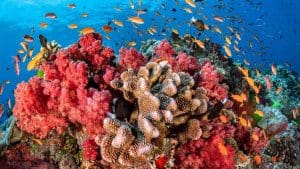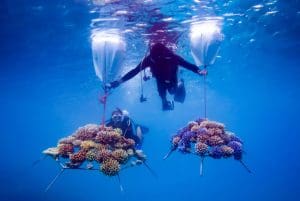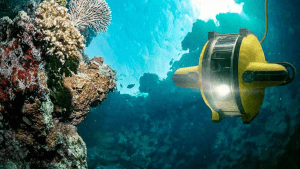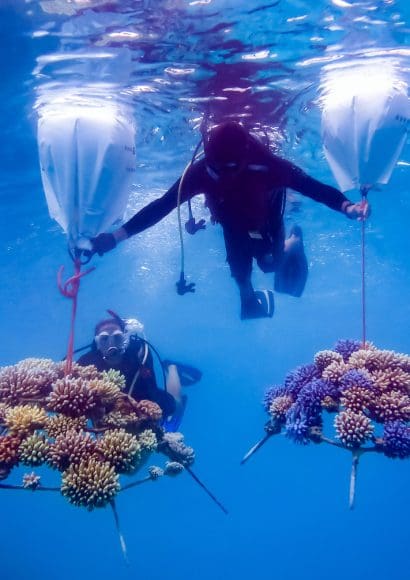
The study of corals and their importance is a fascinating topic that has captured the attention of scientists and ecologists alike. Corals, which seem so fragile and delicate, play essential roles in our marine ecosystems. In this article, we will explore in depth what corals are, why they are so important, and what we can do to protect them.
Contents
What Are Corals?🐟
The Organisms Behind the Reefs
First, it is essential to understand that corals are not plants but marine animals. They belong to the cnidarian group, which also includes jellyfish and sea anemones. Corals are formed by tiny polyps that group together in colonies and build calcium carbonate skeletons, thus forming the well-known coral reefs.
-
- Corals are found mainly in tropical waters.
- There are two main types of corals: hard corals and soft corals.
- Coral reefs are known as the “rainforests of the sea.”

The Importance of Corals in Marine Ecosystems.🐟
Biodiversity and Habitat
Coral reefs host an incredible diversity of marine life. In fact, it is estimated that around 25% of all marine species depend on coral reefs at some point in their lives. These ecosystems provide shelter, food, and breeding areas for numerous species.
-
- Coral reefs are essential for the health of the ocean.
- They provide habitat for thousands of marine species.
- They help protect coastlines from erosion and storms.
Moreover, coral reefs act as natural barriers that protect coastlines from wave and storm erosion. Without them, many coastal communities would be at greater risk of flooding and storm damage. The complex structure of reefs also reduces wave energy, protecting beaches and mangroves located inland.
Source of Resources for Humans
Corals are not only crucial for marine life but also hold great value for humans. Coral reefs provide food, income, and recreational opportunities for millions of people worldwide.
-
- Reef fishing is an important source of food.
- Coral reef ecotourism generates billions of dollars annually.
- Chemical compounds derived from corals are used in medicines.
Additionally, coral reefs are a popular tourist attraction, generating significant income through diving and snorkeling. Furthermore, chemical compounds produced by corals and their inhabitants are used in modern medicine, offering potential treatments for diseases such as cancer, HIV, and bacterial infections.
Threats to Corals.🐟
Climate Change and Coral Bleaching
Unfortunately, corals face numerous threats, with climate change being one of the most severe. The rise in ocean temperature causes coral bleaching, a phenomenon in which corals expel the symbiotic algae that provide them with color and nutrients, which can lead to coral death if conditions do not improve.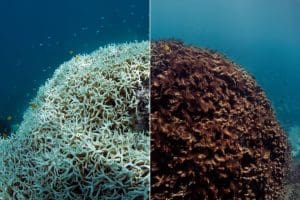
-
- Coral bleaching is directly related to global warming.
- Ocean acidification also affects coral health.
- Pollution and overfishing are other significant threats.
Coral bleaching is a response to thermal stress, and it has become more frequent and severe due to global warming. Additionally, ocean acidification, resulting from increased carbon dioxide in the atmosphere, reduces corals’ ability to build their calcium carbonate skeletons, weakening the reef structure.
For those interested in cooking, check out these 5 recipes with Trucha fish for delicious and healthy meal ideas.
Conservation and Restoration Efforts
Despite the numerous threats, many efforts are underway to protect and restore coral reefs. These efforts include creating marine protected areas, actively restoring reefs, and conducting research to better understand how to help corals adapt to changing conditions.
-
- Marine protected areas help reduce human impact.
- Reef restoration involves transplanting cultured corals.
- Scientific research is key to developing new conservation strategies.

Creating marine protected areas allows reefs to recover from human pressure by limiting activities such as fishing, coral extraction, and irresponsible tourism. Additionally, active reef restoration includes replanting corals cultured in laboratories, which helps regenerate damaged areas and increase the genetic diversity of coral populations.
The Future of Corals.🐟
Innovations and Technology
The future of corals largely depends on our ability to innovate and use technology for their conservation. From using drones to monitor reefs to genetic engineering to create more heat-resistant corals, new technologies are playing a crucial role in the fight to save these vital ecosystems.
-
- Drones and satellites allow remote monitoring of reefs.
- Biotechnology is being used to create resilient corals.
- Public education and awareness are fundamental for conservation success.

For instance, drones and satellites enable scientists to collect detailed data on reef health and threats, facilitating informed decision-making on management and protection. Biotechnology is also enabling the development of corals resistant to heat and acidification, which could help these ecosystems survive in a changing climate.
To understand more about ocean phenomena, read our article on how oceanic whirlpools form and their impact on marine life.
The Importance of Education and Awareness
Finally, it is essential to increase education and awareness about the importance of corals. Educational campaigns can help reduce human threats to coral reefs and promote more sustainable practices.
-
- Educational campaigns can change consumer behavior.
- Community involvement is crucial for conservation.
- Global efforts are necessary to address issues like climate change.

Environmental education in local and global communities is vital to foster greater understanding and appreciation for coral reefs. Awareness campaigns can motivate people to take more sustainable actions, such as reducing plastic use, supporting sustainable seafood, and participating in reef conservation projects.
Conclusion
In summary, the study of corals and their importance is a vital field that affects both marine ecosystems and human communities. By better understanding these incredible organisms and the threats they face, we can take steps to protect them and ensure they continue to thrive for future generations. The biodiversity and ecosystem services that coral reefs provide are irreplaceable. However, without concerted efforts to address climate change and other threats, these vital ecosystems could disappear.
Questions About Corals.🐟
Why are corals important to the marine ecosystem?
Corals are crucial because they host a great diversity of marine species, provide coastal protection, and support local economies through fishing and tourism.
How does climate change affect coral reefs?
Climate change causes ocean temperature rise and acidification, resulting in coral bleaching and weakening of their structures, affecting their ability to survive.
What can be done to protect coral reefs?
Protecting coral reefs involves reducing carbon emissions, establishing marine protected areas, promoting sustainable fishing practices, and participating in coral restoration programs.

